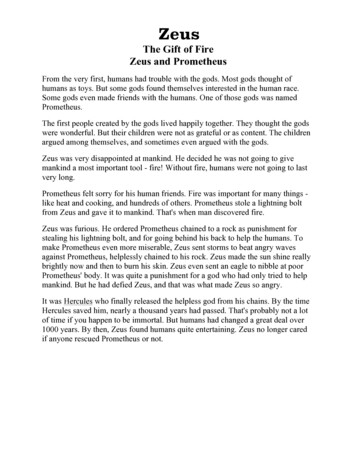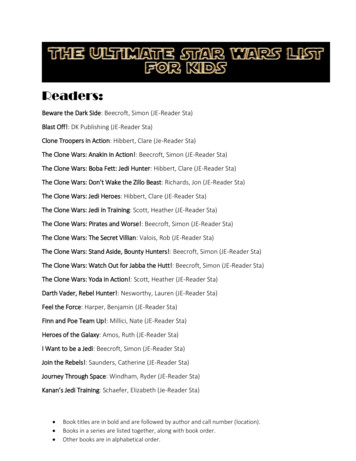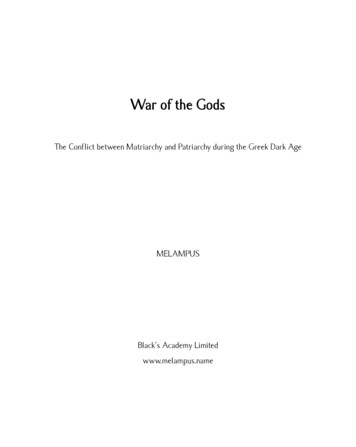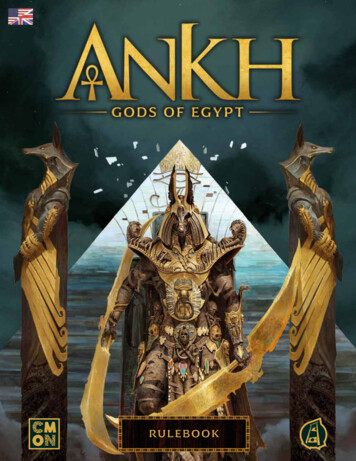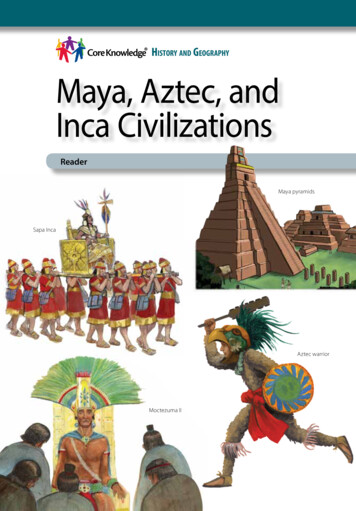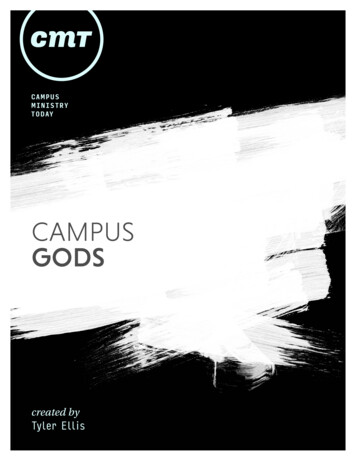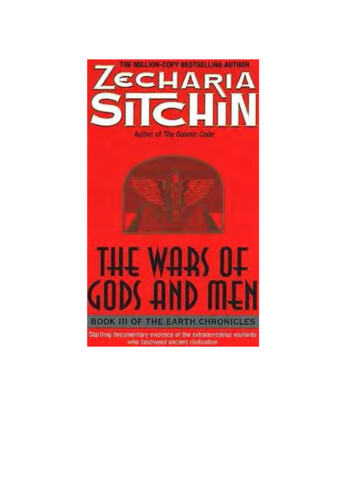
Transcription
TABLE OF CONTENTS1234567891011121314ForewordThe Wars of ManThe Contending of Horus and SethThe Missiles of Zeus and IndraThe Earth ChroniclesThe Wars of the Olden GodsMankind EmergesWhen Earth Was DividedThe Pyramid WarsPeace on Earthvi125497091109129153173The Prisoner in the Pyramid"A Queen Am I!"Prelude to DisasterAbraham: The Fateful YearsThe Nuclear HolocaustEpilogueThe Earth Chronicles: Time ChartSourcesIndex202229251281310343345351366
FOREWORDLong before man warred with man. the gods battled among themselves. Indeed, it was as the Wars of the Gods that the Wars of" Manbegan.And the Wars of the Gods, for control of this Earth, had begunon their own planet.It was thus that mankind's first civilization succumbed to a nuclear holocaust.This is fact, not fiction; it has all been written down long ago—inthe Earth Chronicles.vi
1THE WARS OF MANIn the spring of 1947, a shepherd boy searching for a lost sheep inthe barren cliffs overlooking the Dead Sea, discovered a cave thatcontained Hebrew scrolls hidden inside earthenware jars. Thoseand other scrolls found in the area in subsequent years—collectively spoken of as the Dead Sea Scrolls—had lain undisturbed fornearly two thousand years, carefully wrapped and hidden awayduring the turbulent years when Judea challenged the might of theRoman empire.Was this part of the official library of Jerusalem, carted away tosafety before the city and its temple fell in A.D. 70, or—as mostscholars assume—a library of the Essenes, a sect of hermits withmessianic preoccupations? The opinions are divided, for the library contained both traditional biblical texts as well as writingsdealing with the sect's customs, organization, and beliefs.One of the longest and most complete scrolls, and perhaps themost dramatic, deals with a future war, a kind of Final War. Titledby scholars The War of the Sons of Light Against the Sons of Darkness, it envisages spreading warfare—local battles that will first involve Judea's immediate neighbors, which shall increase in ferocity and scope until the whole ancient world would be engulfed:"The first engagement of the Sons of Light against the Sons ofDarkness, that is against the army of Belial, shall be an attack uponthe troops of Edom, Moab, the Ammonites and the Philistine area;then upon that of the Kittians of Assyria: and upon those violatorsof the Covenant who give them aid. . . ." And after those battles,"they shall advance upon the Kittians of Egypt" and "in due time. . . against the kings of the north."In this War of Men, the scroll prophesied, the God of Israel shalltake an active role:On the day the Kittians fall, there shall be mighty combat andcarnage, in the presence of the God of Israel;For that is the day which He appointed of old for the final battle against the Sons of Darkness.1
2THE WARS OF GODS AND MENThe Prophet Ezekiel had already prophesied the Last Battle, "inthe latter days," involving Gog and Magog, in which the Lordhimself shall "smite thy bow out of thy left hand, and will causethine arrows to fall out of thine right hand." But the Dead Seascroll went further, foreseeing the actual participation of manygods in the battles, engaged in combat side by side with mortalmen:On that day, the Company of the Divine and the Congregationof the Mortals shall engage side by side in combat and carnage.The Sons of Light shall battle against the Sons of Darknesswith a show of godlike might, amid uproarious tumult, amid thewar cries of gods and men.Though Crusaders. Saracens, and countless others in historicaltimes have gone to war "in the name of God," the belief that in awar to come the Lord himself shall be actually present on the battlefield, and that gods and men would fight side by side, sounds asfantasy, to be treated allegorically at best. Yet it is not as extraordinary a notion as it may appear to be, for in earlier times, it was indeed believed that the Wars of Men were not only decreed by thegods but were also fought with the gods' active participation.One of the most romanticized wars, when "love had launched athousand ships," was the War of Troy, between the AchaeanGreeks and the Trojans, ft was, know we not, launched by theGreeks to force the Trojans to return the beautiful Helen to her lawful spouse. Yet an epic Greek tale, the Kypria, represented the waras a premeditated scheme by the great god Zeus:There was a time when thousands upon thousands of men encumbered the broad bosom of the Earth. And having pity onthem, Zeus in his great wisdom resolved to lighten Earth's burden.So he caused the strife at Ilion (Troy) to that end; that throughdeath he might make a void in the race of men.Homer, the Greek storyteller who related the war's events in theIliad, blamed the whim of the gods for instigating the conflict andfor turning and twisting it to its ultimate major proportions. Actingdirectly and indirectly, sometimes seen and sometimes unseen, thevarious gods nudged the principal actors of this human drama totheir fates. And behind it all was Jove (Jupiter/Zeus): "While the
The Wars of Man3other gods and the armed warriors on the plain slept soundly, Jovewas wakeful, for he was thinking how to do honor to Achilles anddestroy much people at the ships of the Achaeans."Even before the battle was joined, the god Apollo began the hostilities: "He sat himself down away from the ships with a face asdark as night, and his silver bow rang death as he shot his arrow inthe midst of them [the Achaeans] . . . For nine whole days he shothis arrows among the people. . . . And all day long, the pyres ofthe dead were burning." When the contending sides agreed topostpone hostilities so that their leaders might decide the issue inhand-to-hand combat, the unhappy gods instructed the goddessMinerva: "Go at once into the Trojan and Achaean hosts, and contrive that the Trojans shall be the first to break their oaths and setupon the Achaeans." Eager for the mission, Minerva "shotthrough the sky as some brilliant meteor . a fiery train of lightfollowed in her wake." Later on, lest the raging warfare cease forthe night, Minerva turned night into day by lighting up the battlefield: She "lifted the thick veil of darkness from their eyes, andmuch light fell upon them, both on the side of the ships and onwhere the fight was raging; and the Achaeans could see Hector andall his men."As the battles raged on and on, sometimes pitching one heroagainst another, the gods, too, kept a watchful eye over individualwarriors, swooping down to snatch away a beleaguered hero or tosteady a driverless chariot. But when the gods and goddesses, finding themselves on opposing sides, began to hurt each other, Zeuscalled a halt, ordering them to keep out of the mortals' fighting.The respite did not last long, for many of the leading combatantswere sons of gods or goddesses (by human mates). Especially angered was Mars, when his son Ascalaphus was pierced to death byone of the Achaeans. "Do not blame me, ye gods that dwell inheaven, if I go to the ships of the Achaeans and avenge the death ofmy son," Mars announced to the other Immortals, "even if in theend I shall be struck by Jove's lightning and shall lie in blood anddust among the corpses.""So long as the gods held themselves aloof from the mortal warriors," wrote Homer, "the Achaeans were triumphant, for Achilles who has long refused to fight was now with them." But in viewof the mounting anger among the gods, and the help the Achaeanswere now getting from the demigod Achilles, Jove changed hismind:
4THE WARS OF GODS AND MEN"For my own part, I shall stay here.seated on Mount Olympus, and look on in peace.But you others, do go among the Trojans and Achaeans,and help either side as you might be disposed."Thus spake Jove, and gave the word for war;Whereon the gods took their several sidesand went into battle.The Battle of Troy, indeed Troy itself, were long thought of asjust part of the fascinating but incredible Greek legends, whichscholars have tolerantly called mythology. Troy and the eventspertaining to it were still considered to be purely mythologicalwhen Charles McLaren suggested, back in 1822, that a certainmound in eastern Turkey, called Hissarlik. was the site of the Homeric Troy. It was only when a businessman named HeinrichSchliemann, risking his own money, came up with spectacular discoveries as he dug up the mound in 1870, that scholars began toacknowledge the existence of Troy. It is now accepted that the Battle of Troy had actually taken place in the thirteenth century B.C. Itwas then, according to the Greek sources, that gods and men hadfought side by side: in such beliefs the Greeks were not alone.In those days, though the tip of Asia Minor facing Europe andthe Aegean Sea were dotted with what were essentially Greek settlements, Asia Minor proper was dominated by the Hittites.Known at first to modem scholars only from biblical references,then from Egyptian inscriptions, the Hittites and their kingdom—Hatti—also came to life as archaeologists began to uncover theirancient cities.The decipherment of the Hittite script and their Indo-Europeanlanguage made it possible to trace their origins to the secondmillennium B.C., when Aryan tribes began to migrate from theCaucasus area—some southeast to India, others southwest to AsiaMinor. The Hittite kingdom nourished circa 1750 B.C. and beganto decline five hundred years later. It was then that the Hittiteswere harassed by incursions from across the Aegean Sea. The Hittiles spoke of the invaders as the people of Achiyawa; many scholars believe that they were the very same people whom Homercalled Achioi—the Achaeans, whose attack upon the western tip ofAsia Minor he immortalized in the Iliad.For centuries prior to the war of Troy, the Hittites expandedtheir kingdom to imperial proportions, claiming to have done soupon the orders of their supreme god TESHUB ("The Stormer").
The Wars of Man5His olden title was "Storm God Whose Strength Makes Dead."and Hittite kings sometimes claimed that the god had actually takena hand in the battle: "The mighty Stormgod, my Lord," [wrote theking Murshilis]. "showed his divine power and shot a thunderbolt" at the enemy, helping to defeat it. Also aiding the Hittites inbattle was the goddess ISHTAR, whose epithet was "Lady of thebattlefield." It was to her "Divine Power" that many a victorywas attributed, as she "came down [from the skies] to smile thehostile countries."Hittite influence, as many references in the Old Testament indicate, extended south into Canaan; but they were there as settlers,not as conquerors. While they treated Canaan as a neutral zone,laying to it no claim, this was not the attitude of the Egyptians. Repeatedly the Pharaohs sought to extend their rule northward to Canaan and the Cedar Land (Lebanon); they succeeded in doing so.circa 1470 B.C. when they defeated a coalition of Canaanite kingsat Megiddo.The Old Testament, and inscriptions left by the Hitti tes' foes,pictured the Hittites as expert warriors who perfected the use of thechariot in the ancient Near East. But the Hittites' own inscriptionssuggest that they went to war only when the gods gave the word,that the enemy was offered a chance to surrender peacefully beforehostilities began, and that once a war was won, the Hittites weresatisfied to receive tribute and take captives: the cities were notsacked; the populace was not massacred.But Thothmes III. the Pharaoh who was victorious at the battleof Megiddo. was proud to say in his inscriptions: "Now his majesty went north, plundering towns and laying encampmentswaste." Of a vanquished king the Pharaoh wrote: "I desolated histowns, set fire to his encampments, made mounds of them; t h e i rresettlement can never take place. All the people I captured. I madeprisoners; their countless cattle I carried off, and their goods aswell. I took away every resource of life; I cut down their grain andfelled all their groves and all their pleasant trees. I totally destroyedit." It was all done, the Pharaoh wrote, on the say-so of AMONRA, his god.The vicious nature of Egyptian warfare and the pitiless destructiveness they inflicted upon a vanquished foe were subjects ofboastful inscriptions. The Pharaoh Pepi I, for example, commemorated his victory over the Asiatic "sand-dwellers" in a poem whichhailed the army which "hacked up the land of the sand-dwellers. . . cut down its fig trees and vines . . . cast fire into all its dwell-
6THEWARSOFGODSANDMENings. killed its people by many tens of thousands." The commemorative inscriptions were accompanied by vivid depictions of thebattle scenes (Fig. 1).Adhering to this wanton tradition, the Pharaoh Pi-Ankhy, whosent troops from Upper Egypt to subdue the rebellious LowerEgypt, was enraged by his generals' suggestion that adversarieswho survived the battle be spared. Vowing "destruction forever,"the Pharaoh announced that he would conic to the captured city "toruin that which had remained." For this, he stated, "My fatherAmon praises me."The god Amon, to whose battle orders the Egyptians attributedtheir viciousness, found his match in the God of Israel. In thewords of the Prophet Jeremiah, "Thus sayeth the Lord of Hosts,the God of Israel: 'I will punish Amon, god of Thebes, and thosewho trust in him, and shall bring retribution upon Egypt and itsgods, its Pharaoh and its kings.' " This, we learn from the Bible,was an ongoing confrontation; nearly a thousand years earlier, inthe days of the Exodus, Yahweh, the God of Israel, smote Egyptwith a scries of afflictions intended not only to soften the heart ofits ruler but also as "judgments against all the gods of Egypt."The miraculous departure of the Israelites out of bondage inEgypt to the Promised Land was attributed in the biblical tale ofExodus to the direct intervention of Yahweh in those momentousevents:
The Wars of Man7And they journeyed from Succothand encamped at Etham, at the edge of the desert.And Yahweh went forth before them,by day in a pillar of cloud to lead them the way,and by night in a pillar of fire to give them light.There then ensued a sea battle of which the Pharaoh preferred toleave no inscriptions; we know of it from the Book of Exodus:And the heart of the Pharaoh and his servantswas changed with respect to the people. . . .And the Egyptians pursued after them,and they overtook them encamped by the sea. . . .And Yahweh drove back the sea with a strong east windall that night, and dried up the waters;and the waters separated.And the Children of Israel went into the midst of the seaupon dry ground. . . .At daybreak, when the Egyptians realized what had happened,the Pharaoh ordered his chariots after the Israelites. But:It came to pass at the time of the morning watchthat Yahweh surveyed the camp of the Egyptiansfrom the pillar of fire and cloud;And he stunned the Egyptian campand loosened the wheels of their chariots,making their driving difficult.And the Egyptians said:"Let us flee from the Israelites,for Yahweh fighteth for them against Egypt."But the Egyptian ruler pursuing the Israelites ordered his chariotsto press on with the attack. The result was calamitous for the Egyptians:And the waters returned,and covered the chariots and the horsemenand all the host of the Pharaoh that was following them;not one of them remained. . . .And Israel beheld the great powerwhich Yahweh had shown upon the Egyptians.
8THE WARS OF GODS AND MENThe biblical language is almost identical to the words of a laterPharaoh, Ramses II, used by h i m to describe the miraculous appearance of" Amon-Ra at his side during a decisive battle foughtwith the Hittites in 1286 B.C.Taking place at the fortress of Kadesh in Lebanon, the battle pitted four divisions of the Pharaoh Ramses II against forces mobilized by the Hittite king Muwatallis from all parts of his empire. Itended with an Egyptian retreat, cutting short Egypt's northwardthrust toward Syria and Mesopotamia. It also drained H i t t i t e resources and left them weakened and exposed.The Hittite victory might have been more decisive, for they hadalmost captured the Pharaoh himself. Only partial Hittite inscriptions dealing with the battle have been found; but Ramses, on hisreturn to Egypt, saw fit to describe in detail the miracle of his escape.Fig. 2His inscriptions on temple walls, accompanied by detailed illustrations (Fig. 2), relate how the Egyptian armies had reached Kadesh and encamped south of it. readying themselves for the battle.Surprisingly the Hittite enemy did not step forward to do battle.Ramses then ordered two of his divisions to advance toward thefortress. It was then that the Hittite chariots appeared as if from nowhere, attacking the advancing divisions from behind and causinghavoc in the encampments of the two others.As the Egyptian troops began to flee in panic. Ramses suddenlyrealized that "His Majesty was all alone with his bodyguard": and"when the king looked behind him, he saw that he was blocked offby 2,500 chariots"—not his own but of the Hittites. Abandoned by
The Wars of Man9his officers, charioteers, and infantry, Ramses turned to his god,reminding him that he finds himself in this predicament only because he had followed the god's orders:And His Majesty said:"What now, my Father Amon?Has a father forgotten his son?Have I ever done anything without you?Whatever I did or did not do,was it not in accordance with your commands?"Reminding the Egyptian god that the enemy was beholden toother gods, Ramses went on to ask: "What are these Asiatics toyou. O Amon? These wretches who know nothing of thee, OGod?"As Ramses went on pleading with his god Amon to save him, forthe god's powers were greater than those of "millions of foot soldiers, of hundreds of thousands of chariot-soldiers," a miraclehappened: the god showed up on the battlefield!Amon heard when I called him.He held out his hand to me, and I rejoiced.He stood behind me and called out:"Forward! Forward!Ramses, beloved of Amon, I am with thee!"Following the command of his god, Ramses tore into the enemytroops. Under the influence of the god the Hittites were inexplicably enfeebled: "their hands dropped to their sides, they were unable to shoot their arrows nor raise their spears." And they calledunto one another: "This is no mortal who is among us: this is amighty god; his deeds are not the deeds of a man; a god is in hislimbs." Thus unopposed, slaying the enemy left and right, Ramsesmanaged to escape.After the death of Muwatallis, Egypt and the Hittite kingdomsigned a peace treaty, and the reigning Pharaoh took a Hittite princess to be his principal wife. The peace was needed because notonly the Hittites but also the Egyptians were increasingly comingunder attack by "Peoples of the Sea"—invaders from Crete andother Greek islands. They gained a foothold on the Mediterraneancoast of Canaan to become the biblical Philistines; but their attackson Egypt proper were beaten back by the Pharaoh Ramses III, who
10THE WARS OF GODS AND MENcommemorated the battle scenes on temple walls (Fig. 3). He attributed his victories to his strict adherence to "the plans of the AllLord, my august divine father, the Lord of the Gods." It was to hisgod Amon-Ra, Ramses wrote, that the credit for the victories wasdue: for it was "Amon-Ra who was after them, destroying them."Fig. 3The bloody trail of man's war against his fellow men in behalf ofthe gods now takes us back to Mesopotamia—the Land Betweenthe Rivers (Euphrates and Tigris)—the biblical Land of Shin'ar.There, as is related in Genesis 11, the first-ever cities arose, withbuildings made with bricks and towers that scraped the skies. Itwas there that recorded history began; it was there that prehistorybegan with the settlements of the Olden Gods.It is a tale of long ago, which we will soon unfold. But right nowlet us return to a thousand years before the dramatic times of Ramses II in Egypt. Then, in faraway Mesopotamia, kingship wastaken over by an ambitious young man. He was called SharruKin—"Righteous Ruler": our textbooks call him Sargon the First.He built a new capital city, calling it Agade, and established thekingdom of Akkad. The Akkadian language, written in a wedgelike (cuneiform) script, was the mother tongue of all the Semiticlanguages, of which Hebrew and Arabic are still in use.Reigning for the better part of the twenty-fourth century B.C.,Sargon attributed his long reign (fifty-four years) to the special status granted him by the Great Gods, who made him "Overseer ofIshtar. Anointed Priest of ANU. Great Righteous Shepherd ofENLIL." It was Enlil, Sargon wrote, "who did not let anybodyoppose Sargon" and who gave Sargon "the region from the UpperSea to the Lower Sea" (from the Mediterranean to the Persian
The Wars of Man11Gulf). It was therefore to "the gate of the House of Enlil" that Sargon brought the captive kings, ropes tied to the dog collars aroundtheir necks.In one of his campaigns across the Zagros mountains, Sargonexperienced the same godly feat that the combatants at Troy hadwitnessed. As he '"was moving into the land of Warahshi . . .when he pressed forward in the darkness . . . Ishtar made a light toshine for him." Thus was Sargon able to "penetrate the gloom" ofdarkness as he led his troops through the mountain passes of today's Luristan.The Akkadian dynasty begun by Sargon reached its peak underhis grandson Naram-Sin ("Whom the god Sin loves"). His conquests, Naram-Sin wrote on his monuments, were possible because his god had armed him with a unique weapon, the "Weaponof the God," and because the other gods granted him their explicitconsent—or even invited him—to enter their regions.Naram-Sin's principal thrust was to the northwest, and his conquests included the city-state of Ebla, whose recently discoveredarchive of clay tablets has caused great scientific interest: "Although since the time of the separation of mankind none of thekings has ever destroyed Annan and Ibla, the god Nergal did openup the path for the mighty Naram-Sin and gave him Annan andIbla. He also gave him as a present Amanus, the Cedar Mountain,to the Upper Sea."Just as Naram-Sin could attribute his successful campaigns to hisheeding the commands of his gods, so was his downfall attributedto his going to war against the word of the gods. Scholars have puttogether from fragments of several versions a text that has been titled The Legend of Naram-Sin. Speaking in the first person. NaramSin explains in this talc of woe that his troubles began when thegoddess Ishtar "changed her plan" and the gods gave their blessing to"seven kings, brothers, glorious and noble; their troops numbered360,000." Coming from what is now Iran, they invaded the mountainlands of Gutium and Elam to the east of Mesopotamia and were threatening Akkad itself. Naram-Sin asked the gods what to do and was toldto put aside his weapons and, instead of going to battle, to go sleepwith his wife (but, for some deep reason, avoid making love):The gods reply to him:"O Naram-Sin, this is our word:This army against you . . .Bind your weapons, in a corner place them!
12THE WARS OF GODS AND MENHold back your boldness, stay at home!Together with your wife, in bed go sleep.but with her you must not . . .Out of your land, unto the enemy, you must not go."But Naram-Sin. announcing that he would rely on his own weapons, decided to attack the enemy in spite of the gods' advice."When the first year arrived, I sent out 120,000 troops, but none ofthem returned alive," Naram-Sin confessed in his inscription.More troops were annihilated in the second and third years, andAkkad was succumbing to death and hunger. On the fourth anniversary of the unauthorized war, Naram-Sin appealed to the greatgod Ea to overrule Ishtar and put his case before the other gods.They advised him to desist from further fighting, promising that"in days to come, Enlil will summon perdition upon the Sons ofEvil," and Akkad would have respite.The promised era of peace lasted about three centuries, duringwhich the olden part of Mesopotamia. Sumer, reemerged as thecenter of kingship, and the oldest urban centers of the ancient world—Ur, Nippur, Lagash, Isin, Larsa—flourished again. Sumer, under the kings of Ur, was the center of an empire that encompassedthe whole of the ancient Near East. But toward the end of the thirdmillennium B.C., the land became the arena for contending loyaltiesand opposing armies; and then that great civilization—man's firstknown civilization—succumbed to a major catastrophe of unprecedented proportions.It was a fateful event which, we believe, was echoed in biblicaltales. It was an event whose memory lingered on for a long time,commemorated and bewailed in numerous lamentation poems;they gave a very graphic description of the havoc and desolationthat befell that great heartland of ancient civilization. It was, thoseMesopotamian texts stated, a catastrophe that befell Sumer as a result of a decision of the great gods sitting in council.It took southern Mesopotamia almost a century to be resettledand another century to fully recover from the divine annihilation.By then, the center of Mesopotamian power had shifted northward,to Babylon. There, a new empire was to rise, proclaiming an ambitious god. MARDUK, as its supreme deity.Circa 1800 B.C. Hammurabi, the king renowned for his lawcode, ascended the throne in Babylon and began to extend itsboundaries. According to his inscriptions the gods not only told
The Wars of Man13him if and when to launch his military campaigns but were literallyleading his armies:Through the power of the great godsthe king, beloved of the god Marduk.reestablished the foundations of Sumer and Akkad.Upon the command of Anu. andwith Enlil advancing in front of his army,with the mighty powers which the great gods gave him.he was no match for the army of Emutbaland its king Rim-Sin. . . .To defeat more enemies the god Marduk granted Hammurabi a"powerful weapon" called "Great Power of Marduk":With the Powerful Weaponwith which Marduk proclaimed his triumphs,the hero [Hammurabi] overthrew in battlethe armies of Eshnuna, Subartu and Gutium. . . .With the "Great Power of Marduk"he overthrew the armies of Sutium, Turukku, Kamu. . . .With the Mighty Power which Anu and Enlil had given himhe defeated all his enemiesas far as the country of Subartu.But before long Babylon had to share its might with a new rivalto its north—Assyria, where not Marduk but the bearded godASHUR ("The All-Seeing") was proclaimed supreme. WhileBabylon tangled with the lands to its south and east, the Assyriansextended their rule northward and westward, as far as "the countryof Lebanon, on the shores of the Great Sea." These were lands inthe domains of the gods NINURTA and ADAD, and the Assyriankings carefully noted that they launched their campaigns on the explicit commands of these great gods. Thus, Tiglat-Pileser I commemorated his wars, in the twelfth century B.C., in the followingwords:Tiglat-Pileser. the legitimate king, king of the world, king ofAssyria, king of all the four regions of the earth;The courageous hero who is guided by the trust-inspiringcommands given by Ashur and Ninurta, the great gods, hislords, thus overthrowing his enemies. . . .
14THE WARS OF GODS AND MENAt the command of my lord Ashur, my hand conquered from beyond the lower Zab River to the Upper Sea which is in the west.Three times I did march against the Nairi countries. . I madebow to my feet 30 kings of the Nairi countries. 1 took hostages fromthem, I received as their tribute horses broken to the yoke. . . .Upon the command of Anu and Adad, the great gods, mylords, I went to the Lebanon mountains; I cut cedar beams forthe temples of Anu and Adad.In assuming the title "king of the world, king of the four regionsof the Earth," the Assyrian kings directly challenged Babylon, forBabylon encompassed the ancient region of Sumerand Akkad. Tolegitimize their claim the Assyrian kings had to take control ofthose olden cities where the Great Gods had their homes in oldentimes; but the way to these sites was blocked by Babylon. The featwas achieved in the ninth century B.C. by Shalmaneser III; he saidthus in his inscriptions:I marched against Akkad to avenge . . . and inflicted defeat. . I entered Kutha, Babylon and Borsippa.I offered sacrifices to the gods of the sacred cities of Akkad. Iwent further downstream to Chaldea, and received tribute fromall the kings of Chaldea. . . .At that time, Ashur, the great lord . . . gave me scepter, staff. all that was necessary to rule the people.I was acting only upon the trustworthy commands given byAshur, the great lord, my lord who loves me.Describing his various military campaigns, Shalmaneser assertedthat his victories were achieved with weapons provided by two gods:"I fought with the Mighty Force which Ashur, my lord, had givenme; and with the strong weapons which Nergal, my leader, had presented to me." The weapon of Ashur was described as having a "terrifying brilliance." In a war with Adini the enemy fled on seeing "theterrifying Brilliance of Ashur; it overwhelmed them."When Babylon, after several acts of defiance, was sacked by theAssyrian king Sennacherib (in 689 B.C), its demise was made possible because its own god, Marduk, became angry with its king andpeople, and decreed that "seventy years shall be the measure of itsdesolation"—exactly as the God of Israel had later decreed for Jerusalem. With the subjugation of the whole of Mesopotamia, Sennacheribwas able to assume the cherished title "King of Sumer and Akkad."
The Wars of Man15In his inscriptions, Sennacherib also described his military campaigns along the Mediterranean coast, leading to battles with theEgyptians at the gateway to the Sinai peninsula. His list of conquered cities reads like a chapter in the Old Testament—Sidon,Tyre, Byblos, Akko, Ashdod, Ashkalon—"strong cities" th
gods but were also fought with the gods' active participation. One of the most romanticized wars, when "love had launched a thousand ships," was the War of Troy, between the Achaean Gre
